Key takeaways:
- Trust is built through consistent actions, open communication, and shared vulnerability.
- Reciprocity and mutual investment strengthen relationships and foster a sense of safety.
- Addressing trust issues through honest dialogue can rebuild bonds and enhance understanding.
- Continuous support and reliability are critical to maintaining trust over time.
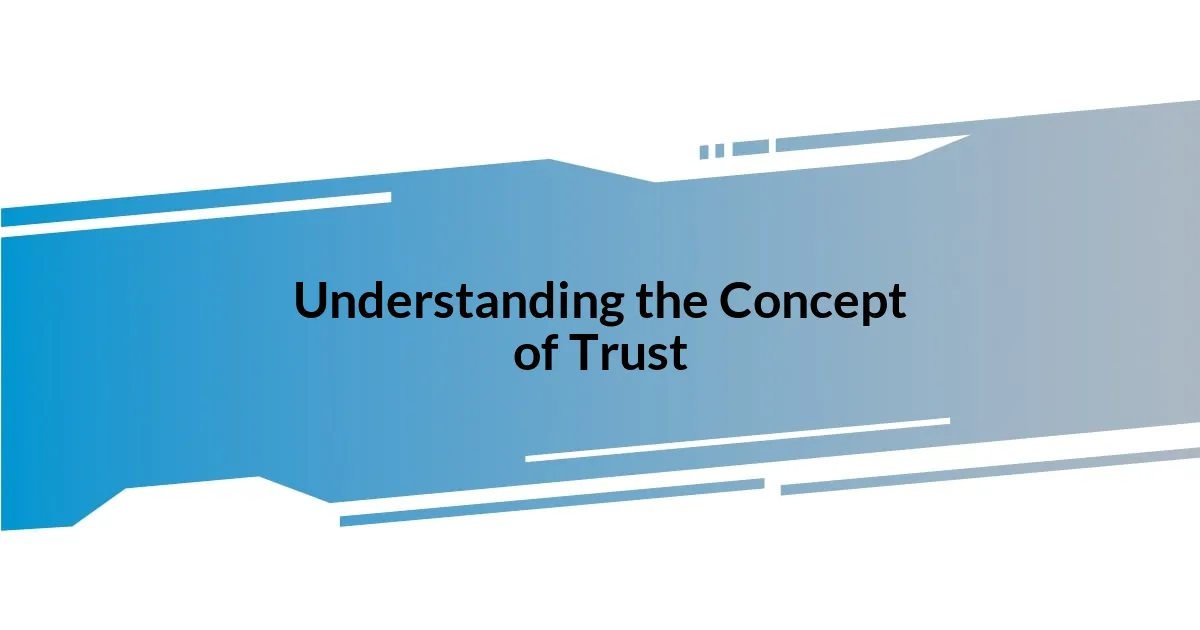
Understanding the Concept of Trust
Trust is often likened to a delicate bridge, built over time with consistent actions and shared experiences. I remember a time when a colleague and I were tasked with a high-stakes project. When he met every deadline and kept me informed, my confidence in his abilities solidified. This reinforced my belief that trust isn’t just about grand gestures; it’s about the everyday reliability that fosters a sense of safety and mutual respect.
Have you ever wondered why trust feels so elusive yet so fundamental? I’ve found that vulnerability plays a significant role in trust-building. When I opened up about my struggles in a team meeting, I noticed others followed suit, creating a sense of camaraderie. Sharing our fears and challenges helped us connect on a deeper level, making trust feel like a natural outcome of our openness.
At its core, trust is a two-way street, and I’ve seen firsthand how important reciprocity is in nurturing it. In a previous role, I made it a point to actively listen and respond to my team’s feedback. This mutual investment not only strengthened our working relationships but also allowed us to achieve our goals more effectively. Trust thrives on transparency and genuine interactions, turning a group of individuals into a cohesive team.
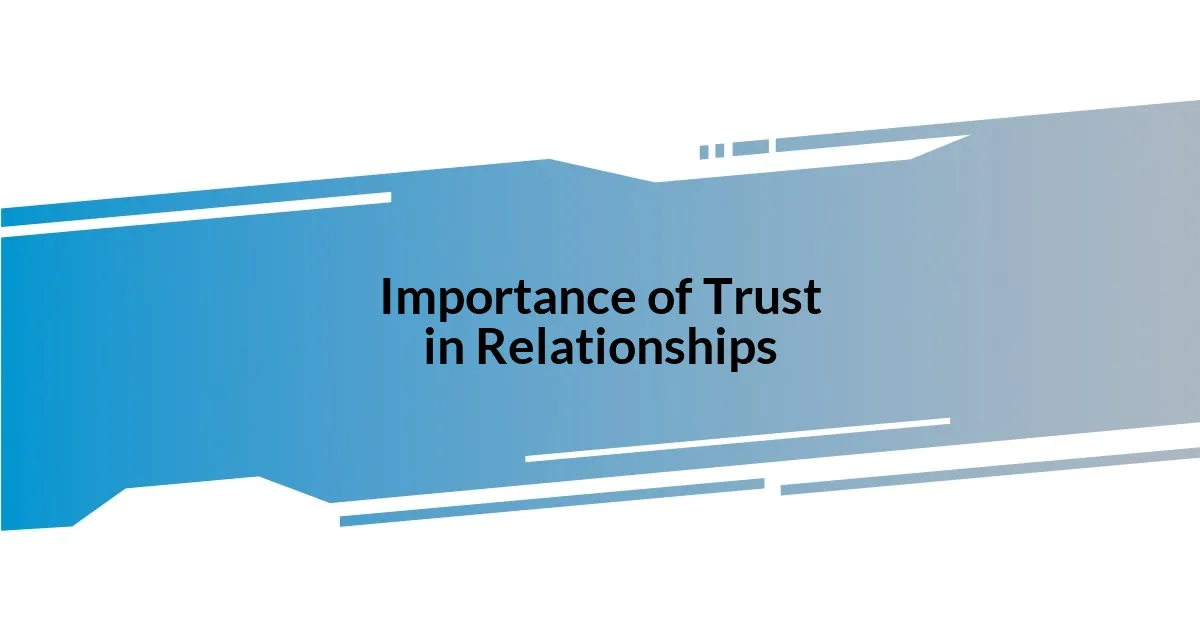
Importance of Trust in Relationships
Building trust in relationships is essential for their longevity and strength. I recall a friendship that fell apart due to a miscommunication, which highlighted just how fragile trust can be. When I reached out to reconnect, it was the honest conversation and acknowledgment of our misunderstandings that laid the groundwork for rebuilding our bond.
Here are some key reasons why trust matters in relationships:
- Fosters Open Communication: When trust is present, I feel more comfortable sharing my thoughts and feelings, knowing that they will be valued.
- Enhances Collaboration: In team settings, trust allows for greater collaboration, as everyone feels free to contribute ideas without fear of judgment.
- Promotes Emotional Safety: Trust creates a secure environment where individuals can express vulnerability without the risk of betrayal or ridicule.
- Strengthens Resilience: Relationships built on trust can withstand challenges, as the faith in one another acts as a protective barrier against conflict.
- Encourages Accountability: Trust encourages partners and colleagues to hold each other accountable in a respectful way, driving progress and growth.
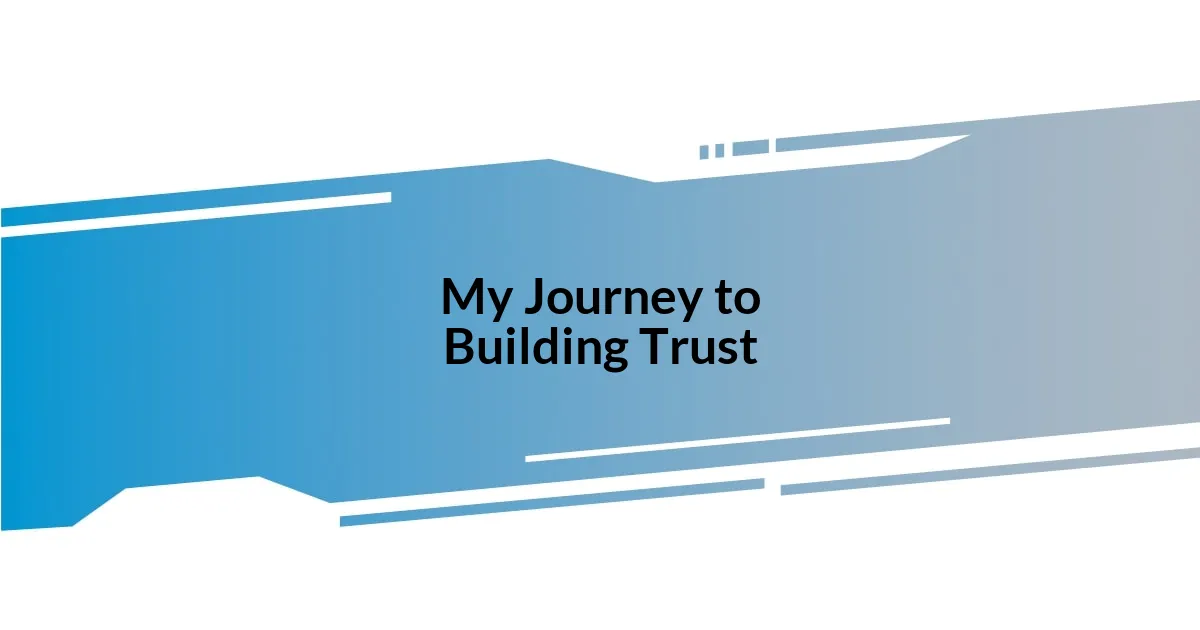
My Journey to Building Trust
Building trust has been a journey filled with both challenges and rewarding moments. I remember a time when I was leading a team project, and I decided to share a personal story about my initial struggles with teamwork. It was a risk, but the moment I opened that door, team members began to share their experiences too. That wasn’t just a moment of vulnerability; it felt like we created an unbreakable bond that laid a strong foundation for trust.
As I reflected on my journey, I realized that vulnerability plays a crucial role. A few years ago, during a particularly stressful period at work, I openly expressed my anxieties to my staff. Surprisingly, this moment brought us closer. They responded with encouragement and shared their own trials, and from that point, it was clear that authenticity fosters trust. This experience taught me that by embracing my imperfections, I encourage others to do the same, weaving a tighter fabric of trust among us.
Through my experiences, I’ve often contemplated how crucial consistency is in trust-building. After a colleague faced a setback, I made it a point to be there for her consistently. It wasn’t just about offering a shoulder to cry on but also about following up regularly, ensuring she knew I was genuinely invested in her well-being. This practice of being reliably present solidified not only her trust in me but also reinforced a culture of support within our team.
| Key Insights | My Personal Experiences |
|---|---|
| The Role of Vulnerability | Sharing my struggles led to deeper connections within my team. |
| The Impact of Consistency | Being consistently supportive transformed my relationship with colleagues during tough times. |
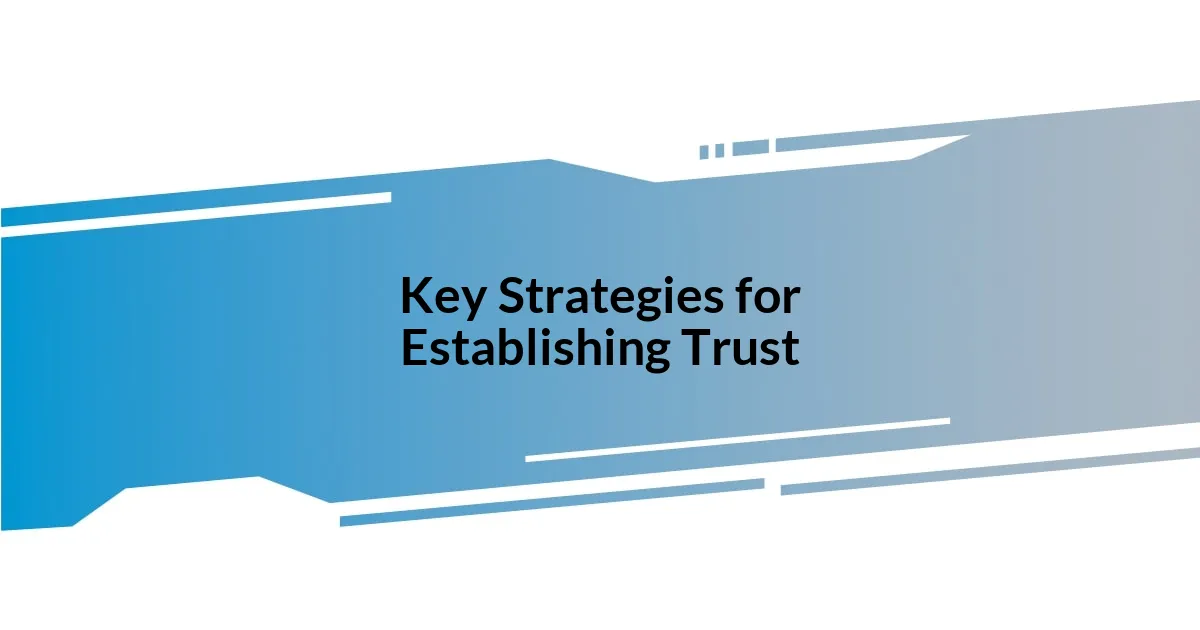
Key Strategies for Establishing Trust
Establishing trust requires a clear and consistent approach in our interactions. I remember a time when I took the initiative to clarify roles during a team project. By openly discussing expectations and encouraging feedback, the atmosphere shifted. Everyone felt more secure in their contributions, and it became a valuable lesson: transparency is key in creating a trusting environment.
One evening, after a long day of meetings, I decided to send a simple thank-you message to my team for their hard work. It wasn’t just about recognition; it was a genuine expression of gratitude. I realized that small gestures of appreciation can significantly enhance trust. They demonstrate that I see and value their efforts, fostering a sense of belonging and commitment that is essential in any relationship.
There’s also something powerful about being reliable. I recall when a close friend confided in me about facing a personal issue. I made it a point to check in regularly, not just once, but repeatedly. This reliability communicated a sincere investment in her well-being, reinforcing our bond. It’s amazing how being dependable fosters trust—after all, who wouldn’t feel secure knowing someone truly cares enough to be there time after time?
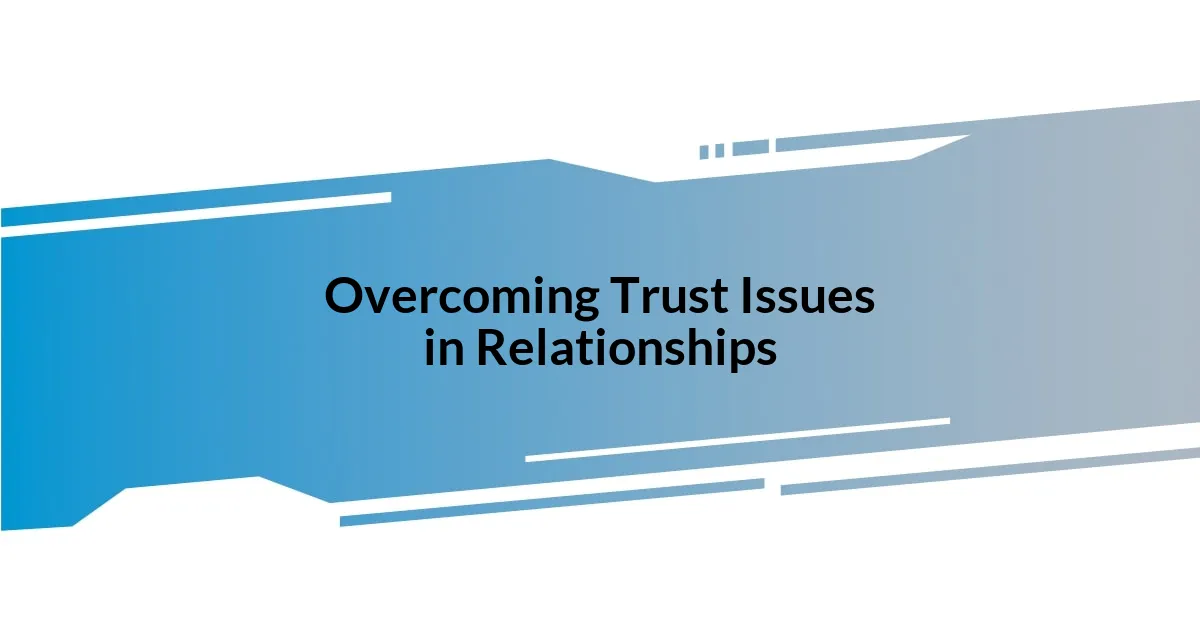
Overcoming Trust Issues in Relationships
Overcoming trust issues in relationships often requires patience and understanding. I vividly recall a time when I felt misplaced distrust towards a friend who had let me down. Instead of immediately confronting them, I took a step back to reflect on my feelings. This moment of pause helped me realize that their actions were more about their struggles than a personal betrayal, allowing me to approach the situation with compassion rather than anger.
On another occasion, I found myself grappling with trust after a disagreement with a family member. Rather than letting resentment fester, I initiated an open conversation about our feelings. It was nerve-wracking, but when I openly shared my perspective and listened to theirs, we unearthed common ground. This experience taught me that honest dialogue can break down walls and rebuild trust, even when it feels like a daunting task.
In my experience, it’s essential to acknowledge and communicate the specific triggers that cause distrust. For instance, when a partner missed an important event, I felt the familiar pang of betrayal. Instead of bottling it up, I expressed how it affected me, and to my surprise, they were genuinely remorseful. This not only clarified my feelings but also led to a deeper understanding of each other’s expectations, reinforcing our bond through honest feedback.
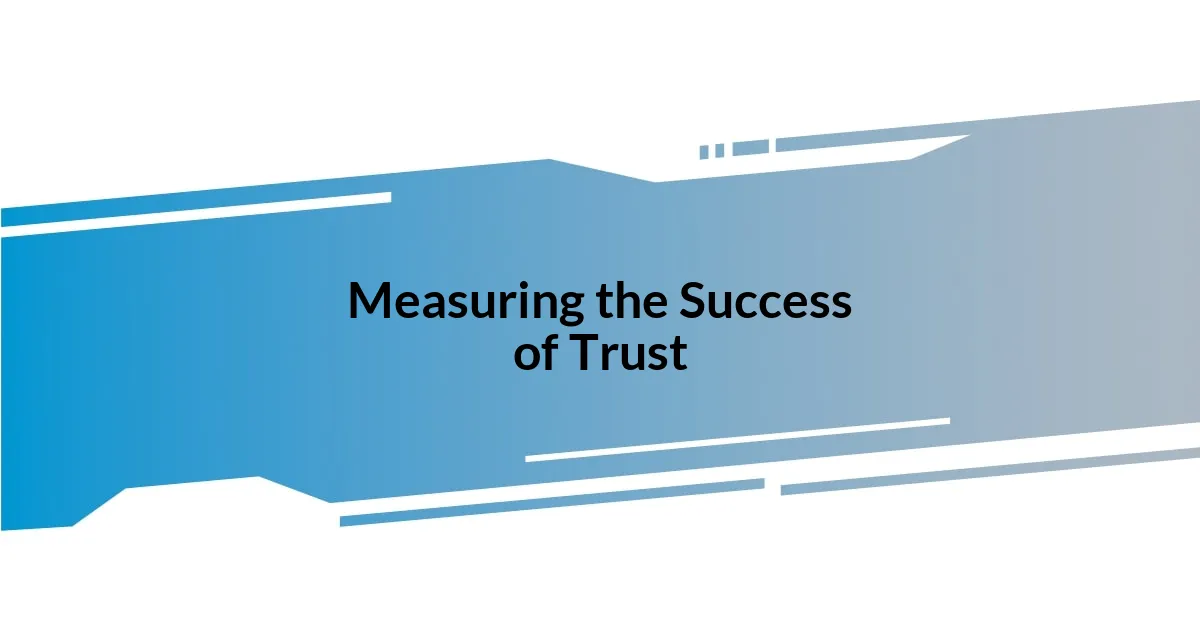
Measuring the Success of Trust
To truly measure the success of trust, I believe it’s essential to assess how open people feel in sharing their thoughts. For instance, I once led a brainstorming session where I explicitly encouraged my team to voice their ideas, no matter how unconventional they might seem. The flood of creativity surprised me and showcased that fostering an environment where everyone feels comfortable expressing themselves can significantly indicate trust levels within a group.
Another practical way I’ve gauged trust is through feedback. I remember initiating anonymous surveys after team projects to gather insights on my leadership style. The honest responses revealed areas I could improve on, but more importantly, they highlighted that team members felt safe enough to share their true thoughts. Isn’t it insightful how an open feedback channel can serve as a mirror reflecting the trust you’ve built? By being receptive to critique, I noticed my relationships deepening, and the trustworthiness of my leadership became increasingly clear.
Lastly, I often observe the consistency of actions over time as a measure of trust. Reflecting on a past experience with a colleague, we committed to a shared goal and regularly checked in on each other’s progress. When we consistently held ourselves accountable, it solidified our trust in one another. Have you ever noticed that the more reliable we are in our commitments, the stronger the foundation of trust becomes? I certainly have, and it reminds me that trust is not just a feeling but a tangible outcome of our consistent behaviors and interactions.
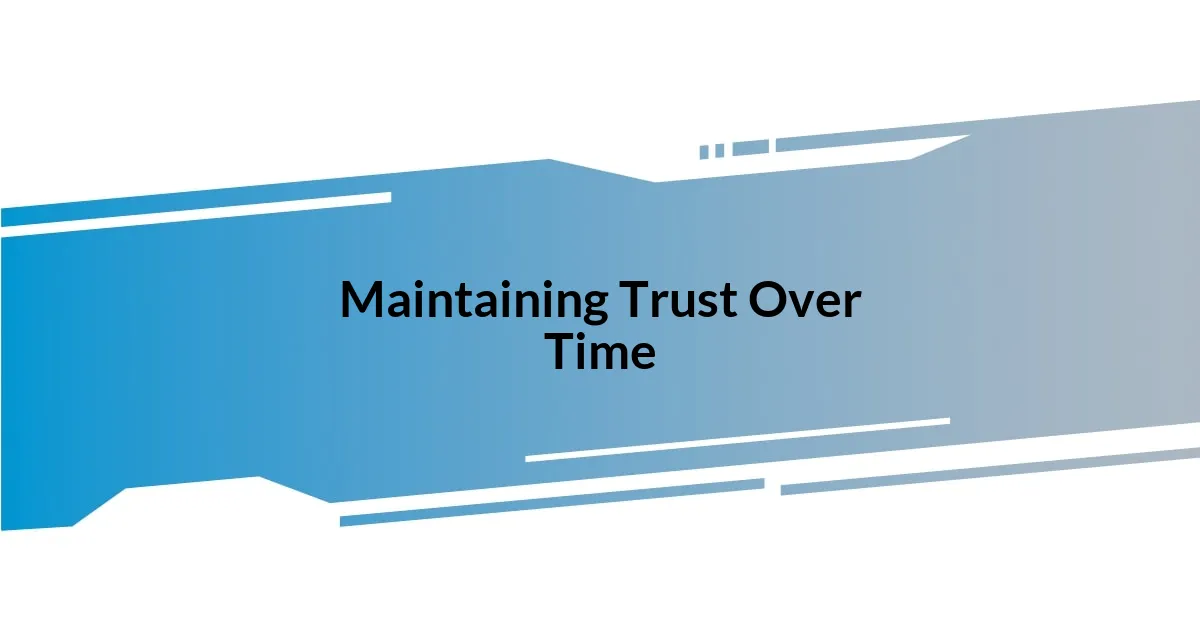
Maintaining Trust Over Time
Maintaining trust over time is an ongoing journey, and I’ve learned that consistency is key. I remember a situation where I made a commitment to a friend to always be there during tough times. When they faced a challenging moment, I dropped everything to support them. That experience reinforced the idea that showing up consistently in times of need creates a solid foundation for trust to flourish.
Another element I’ve found crucial is continuous communication. During a project at work, I made it a point to check in regularly with my team. Sharing updates, encouraging them to voice concerns, and listening actively showed them that I valued their input. Have you ever noticed how easy it is for misunderstandings to creep in when communication fizzles? Keeping a channel open fosters a sense of security that helps trust grow stronger.
Lastly, I’ve observed that vulnerability plays a surprising role in maintaining trust. I often share my own struggles with colleagues during team meetings. This openness not only makes them feel more comfortable sharing their challenges but also cultivates an atmosphere of mutual understanding. Isn’t it fascinating how being authentic can create deeper connections? In my experience, the more real we are with each other, the more trust we build, layer by layer.